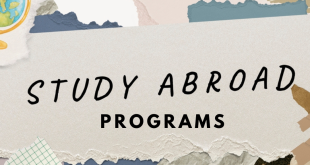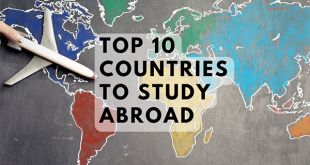The allure of studying overseas is undeniable, as it offers students a chance to experience diverse cultures, gain a global perspective and broaden their academic horizons. However, obstacles such as cultural differences, language barriers, and the fear of being far from home are common concerns. And there’s also the hefty price tag, which often makes it seem like an unattainable goal for most students. But there’s good news – studying abroad doesn’t have to break the bank. In this article, we’ll explore practical tips and advice on how students can study abroad for free. Join us on a journey to discover innovative strategies and alternative funding sources to make your study abroad dream an attainable reality.
Table of Contents
Studying Abroad For Free, Is It Really Possible?
Embarking on a quest for ways to study abroad for free may seem like an impossible endevour. With university fees escalating worldwide, the notion of obtaining a recognized degree without a hefty budget just seems implausible. However, there are interestingly several options that eager enough students can work out. While fully escaping tuition cost might be a bit of a stretch, there are numerous scholarships and programs that can bring you remarkably close to that possibility.
And that’s our first trick: turn to scholarships and financial aid! In today’s global landscape, governments, schools, and nonprofits actively endorse cultural exchange, creating avenues for affordable education. The other option is to look out for countries that offer free or very affordable education. As a matter of fact, we are today more than ever close to dispelling the myth that quality higher education is a luxury.
Additionally, for ambitious students with a stellar academic track record, the path to studying abroad for free is paved with possibilities! And there’s more, affordable education systems don’t necessarily mean that they compromise on the quality of the education they provide. So, with determination and the right information, the prospect of pursuing a degree abroad for free or at the lowest cost isn’t that out of reach anymore. Let’s get into these points in details!
Countries Offering the Possibility to Study For Free
In parallel with the rising university fees globally, there are many countries where it’s actually possible to study for free or at an affordable cost. We’ve compiled for you a selection of such places that actually offer minimal university fees.
For each one of them, we have guides related on the reputable institutions, living cost, tuition fees and other practical details for students. Make sure to check out our articles to have all the information you need in hand.
Where Can You Study Abroad For Free in Europe
Germany
The first country where you can study for free is Germany, where both local and international students can benefit from their no-tuition policy. In fact, most public universities charge no tuition fees for undergraduate programs in Germany, requiring only a small fee of around €150-250 (~US$170-280) for administration.
While Baden-Württemberg reintroduced fees for non-EU/EEA students, other states still provide cost-free education. Some top universities, like Heidelberg and Technical University of Munich, even offer 100% fee waivers for international students, showcasing Germany’s commitment to welcoming learners from around the world.
Check out our ultimate guide on studying abroad in Germany.
Norway
The next European country where you can study for free regardless of your nationality is Norway. Norwegian universities offer tuition-free education, with only a semester fee of around NOK 300-600 (~US$33-66). Most undergraduate programs are in Norwegian, but English options are available at master’s and PhD levels.
Additionally, Norway emphasizes equal education for all, providing free education to students from both EU and non-EU countries. While some universities may require a refundable deposit for living expenses, top free universities like Bergen University College and Norwegian University of Science and Technology offer courses at an accessible cost.
Read here about the studying and living cost in Norway.
Poland
Another country that has a free education option available for international students is Poland. As a matter of fact, full-time studies in Polish at state Higher Education Institutions are free for Polish citizens, EU/EEA citizens, and holders of the Polish Charter.
Other foreigners pay tuition, a very affordable amount ranging around EUR 2,000 to 3,000 per year for regular programs. Moreover, in Poland, doctoral colleges offer not just free education, but also scholarships for their students!
Other European Countries Where You Can Study for Free
There are other European countries that offer free higher education to international students, but their eligibility criteria may vary.
In Denmark, Sweden, and Finland, for example, EU/EEA students can enjoy tuition-free bachelor’s and master’s programs. Non-EU/EEA students, however, may need to pay. Ph.D. programs, on the other hand, are fully funded, providing an excellent opportunity for international students.
These countries also have some free education options through partnerships and scholarships. In Denmark, non-EU students can explore scholarships for tuition waivers. Additionally, Finland offers free education for EU students and financial aid for non-EU students who pursue programs in Finnish or Swedish.
Furthermore, countries like Ireland, Spain, Greece, Czech Republic or Italy provide entirely free higher education for local and EU students. They also provide tuition-free education for students in programs taught in the local language. And of course, for international students who don’t meet any of these criteria, various scholarships options remain available.
Read here our top 10 of the most affordable countries in Europe for international students.
Other Free Education (or Very Low Cost) Countries for International Students
International students can enjoy a very affordable yet high quality education in the following countries:
- France, where public universities charge just €170 per year for EU students, slightly higher for non-EU students. Additional charges apply for specialized programs. Scholarships are also available despite a reasonable living cost, especially outside Paris.
- Belgium, within its two language communities, charges EU students a maximum of €906 annually. Non-EU international students pay around €4,175 per year.
- Argentina, where the average monthly living cost is $550-$750. The average tuition cost of a semester (without housing) through direct enrollment ranges from $200 to $3,000.
- China provides a low-cost option for students interested in ancient history and art. Moreover, the average tuition fee range between $2000 and $7000 per semester.
5 Ways You Can Study Cheap and Even for Free Abroad
Dreaming of studying abroad but worried about the cost? The truth is, it might not be as expensive as you think! Especially if you implement the right strategies and with a little help. Apart from choosing an affordable destination or a place that actually offers free education abroad, we’ve put together some simple ways to cut down on expenses and fulfill your dream of studying abroad without filing for bankruptcy!
Scholarships and Grants
The very first strategy that actually allows students to study abroad for free is to apply for scholarships and grants. These are opportunities that cut out study costs, making international education attainable at lower cost and even for free. And there is a plethora of options spanning subjects, countries, and programs available.
The other option is to search for grants that are mostly need-based. Scholarships on the other hand are often to academic prowess or achievements. To benefit these scholarships and grants , there are specialized websites where you can check for scholarship programs matching your program, study focus and available in your host country.
Though competitive, fully-funded scholarships are one of the best pathways to studying abroad for free.
Get more details on the subject in our article on how to fund your studies abroad.
Student Jobs and Work-and-Study Programs
Another effective strategy is to find a summer job, showcasing your determination to fund your studies by yourself. As a matter of fact, some countries permit students to work while attending classes, offering a chance to gain international work experience. Whether it’s tutoring, administrative roles, or co-op programs, working abroad can cover living costs and grant valuable international work experience.
Completing a work-study program is another way that applies in countries such as Australia or New Zealand. The benefit is that you can add your work experience on your resume, brightening further your future job prospect. And that makes the effort to work and study abroad a golden opportunity during and past your journey overseas!
Check here our tips on how to study for free in New Zealand.
Study Abroad for Free: Student Loan and/or Fundraising Campaign
While student loans might not enable you to study entirely cost-free, they offer flexibility, and eventually an immediate boost toward affordable education. And the best way to make that work for you is to explore private and state loan options in your home country. And if you don’t find any solution that works for you, you can kick-start a fundraising campaign.
Beyond scholarships and loans, personal fundraising can help bridge the financial gap. Engage friends and family, make use of crowdfunding platforms, and present your case effectively. A concise project description, cost breakdown, compelling video, and thoughtful incentives can make your study abroad project financially feasible.
Participate in an Exchange Program or Undertake International Internships
The following two strategies may sound like unconventional ways to study abroad for free, but hear us out. Firstly, international internships, paid or unpaid. Paid internships come with a salary, crucial for covering living costs, though they demand high qualifications. Unpaid internships, on the other hand, offer benefits like a living expense stipend and flexible requirements.
And there is participating in exchange programs. Again, it may sound a bit of a stretch. However, these programs generally involve partnerships between universities, allowing you to pay tuition at your home institution while studying abroad. Reciprocal arrangements let students swap places, allowing you to get the full experience abroad without breaking the bank!
Read here our comprehensive guide on internships abroad.
Study Abroad For Free Virtually
The very last option to check if you want to study abroad for free is to cut the cost through online learning. Today’s world is ultra connected, enabling students from all over the world to get a global education from the comfort of their home. And there’s no better way to save money, as online programs are much more affordable. Better yet, no transport or accommodation expenses, and no food cost if you still live with your parents!
Moreover, this option allows flexibility in scheduling your studies, fitting them around family and work commitments. You can access a multitude of courses and top universities globally. And you can even enhance your digital and communication skills through online interaction. Virtual education is also a great option for students with mobility or medical concerns to get a fully immersive global education experience.
We have here a guide on distance and online learning in the UK as well as in the U.S.




 Aljawaz Your guide to study abroad
Aljawaz Your guide to study abroad
















